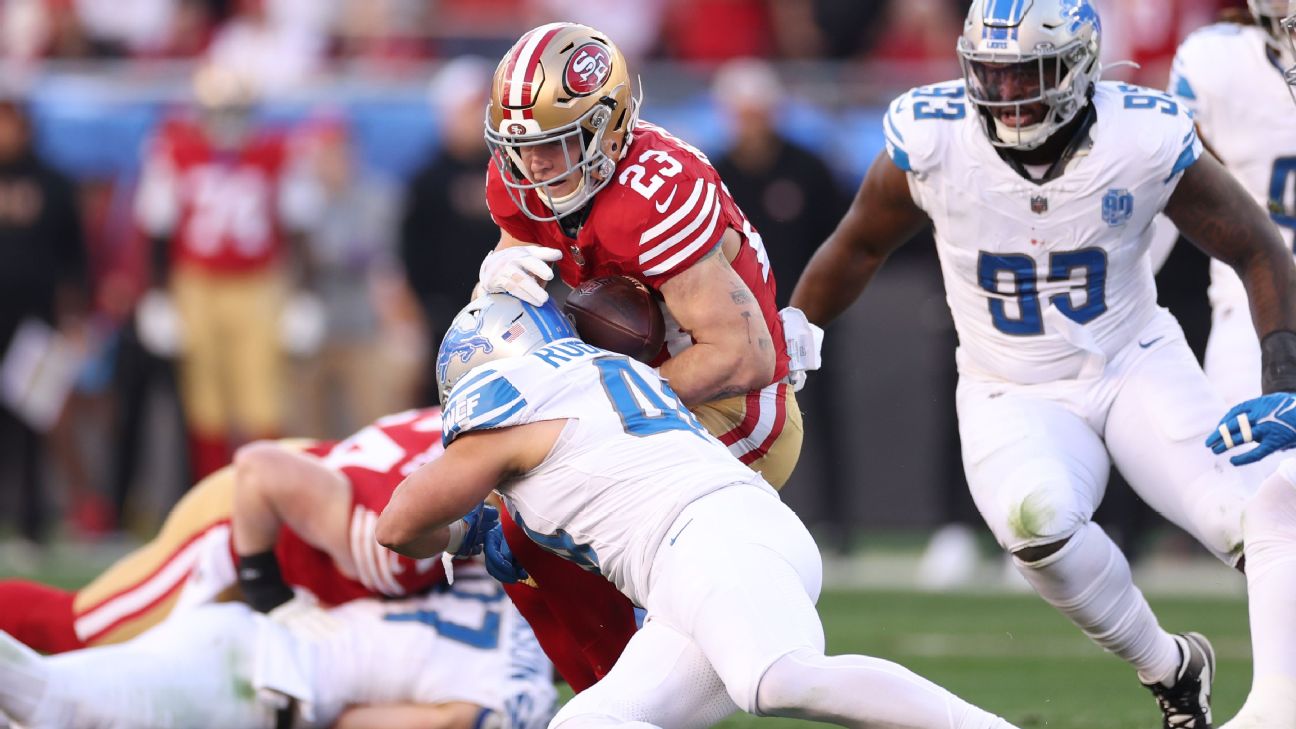Tiger Woods and Nike are splitting up: 'There will certainly be another chapter'
"It was a hell of a round, Tiger."
And just like that, one of the most prolific commercial partnerships in the history of sport was over.
After 27 years, 15 major championships, 82 PGA Tour wins and hundreds of millions of dollars in endorsement contracts, Tiger Woods and Nike announced the end of their collaboration on Monday.
'Hello World'
When Nike and Woods sealed their first deal in 1996, a 20-year-old - just turned professional - became heir to a $40 million fortune.
Promised across a five-year deal, the numbers were remarkable for any athlete, let alone for a rookie - yet Woods was a remarkable professional debutant.
A six-time junior world championship winner and the first three-peat US Amateur champion, as Nike looked to sign the most talented prodigies across the sporting world, few came more prodigious than the Stanford University starlet.
Their decision was vindicated almost immediately, records tumbling as Woods hurtled towards golf's summit at breakneck pace. Within a year of Nike's iconic "Hello World" commercial - based on Woods' maiden pro event press conference - their new star had won three PGA Tour events, become the youngest winner of The Masters and become the fastest player to reach world No. 1 after turning pro.
When Woods signed a five-year endorsement contract with Nike in 2000 worth an estimated $85 million - an unprecedented sum in sporting history at the time - his status as golf's dominant force and a global sporting superstar was concrete.
For Nike, more typically associated with other sports, it was a dream come true. With Woods marking the sportswear company's "significant entry" into golf, the partnership - and its impact - was "seismic," explained Ben Peppi, sports commercial expert at JMW Solicitors.
"For a long time post-Michael Jordan's retirement, pre-Cristiano Ronaldo, Tiger Woods was Nike," Peppi told CNN Sport.
"He is one of the transcendent athletes that Nike have had as a brand ambassador for the duration of their partnership. He transcends his sport - he wasn't just a golf ambassador, he was a Nike icon."
As Woods became synonymous with golf, Nike became synonymous with Woods. From cap to shoes, the company's swoosh logo was ever-visible for the countless iconic shots and trophy lifts Woods celebrated across his career, aided by a string of memorable commercial campaigns, from "Golf's Not Hard" to "Never."
It meant that Nike's massive outlay on Woods across the 48-year-old's career often reaped significant reward. Almost 57% of Nike's investment in Woods' (then) $181 million endorsement deal was made back from the sale of golf balls alone between 2000 and 2010, according to a 2013 university study examining the golfer's impact on ball sales.
When he donned his trademark Sunday red polo and a black Nike cap emblazoned with his own "TW" logo to defy expectations and claim The Masters in 2019, one sponsorship analytics research firm calculated Nike had received roughly $22 million worth of exposure from the win.
"Particularly in a sport where you see players' shirts covered in different sponsorships, all you ever saw with Tiger was Nike - a swoosh and nothing else," Peppi said.
"That says something about the importance, not only of Tiger to Nike, but also of Nike to Tiger ... not many athletes get their own logo with their brand - Nike or whoever else."
An amicable break-up
Woods' relationship with Nike remained steadfast through a series of off-course scandals, even as other sponsors cut ties.
While brands such as Gatorade, AT&T and Accenture pulled the plug on deals following his professed infidelity in late 2009 - losing him an estimated $20 million - Nike stood by the star. When the golfer won the 2013 Arnold Palmer Invitational to make his long-awaited return to world No. 1, Nike toasted the feat with a "winning takes care of everything" advert.
Woods signed a 10-year deal that year worth an estimated $200 million, though by 2019 it was worth roughly half of that sum annually, Bob Dorfman, an endorsement and executive creative director at Baker Street Advertising, said at the time.
And despite Nike reeling in its golf equipment business in 2016, stopping production of golf clubs, balls and bags - leading Woods to use other brands - their partnership continued, even as Woods switched to FootJoy shoes for additional ankle support following his recovery from a serious car accident in 2021.
Those leg injuries - and various subsequent surgeries - have severely limited the golfer's playing time ever since, yet Woods has continued to represent Nike in his sporadic competitive appearances.
"Like golf fans around the world, we are delighted to see Tiger back on the course," Nike said in a statement upon his return to competitive action at the 2022 Masters.
"He is an incredible athlete, and it is phenomenal to see him returning to the game at this level. His story continues to transcend sport and inspire us all. As he continues his return, we will work with him to meet his new needs."
The seemingly amicable nature of the partnership was reflected in the parting statements from both sides - Nike lauding the golfer for challenging "stereotypes, conventions" and "the old school way of thinking," with Woods offering special thanks to Nike co-founder Phil Knight in a post on X.
It is because of this accumulated good faith that Peppi believes the split came down to a financial decision, specifically on Woods' side - as opposed to concerns over the golfer's playing time or the desire to re-center on a younger name.
"There's not like there's necessarily been a falling out or anything," Peppi said.
"If Nike were staying in golf, they certainly wouldn't end their partnership with Tiger ... they would have been in a better negotiating position than most given the legacy of the relationship.
"Even if they wanted to go younger with a hero ambassador as such - an up-and-coming young golfer who is going to be what Tiger was in 96' to 97' - then that could be the case, but there still would have been an offer there for Tiger, it just might not have been what he was used to."
The next chapter
Woods made it clear in his statement that "another chapter" is certain, but what could that look like, both for himself and for Nike?
Peppi finds speculation that Nike could be scaling back from golf "consistent" with their retreat from equipment production in 2016, splits from other high-profile golfers - most notably Australia's former world No. 1 Jason Day earlier this month - and rumors that their golf apparel production could be next to go.
"There's clearly a shift going on," Peppi said.
"Nike is obviously an incumbent in the market and there are new challenger brands that you're seeing now come to the fore when it comes to golf apparel, designed to cater to this new generation of golfer.
"Golf as an industry needs to engage a new audience, and Nike have maybe decided that golf generally is not where they need to be from an apparel standpoint.
"So it's almost like you could suggest that Nike Golf started and ended with Tiger," he added.
Nike has been here before. In the summer of 2018, tennis icon Roger Federer ended a similarly synonymous 24-year partnership with the brand to move to Japanese clothing retail chain Uniqlo on a 10-year, $300 million contract.
The fact both have now left for new pastures could be a sign that seemingly endless, one-brand partnerships between brands and athletes could be scarce looking ahead, Peppi theorized.
"You look at Michael Jordan and Nike, you look at David Beckham and Adidas, Usain Bolt and Puma - you still have those synonymous relationships, and you would have assumed that Roger Federer and Tiger would have done the same with Nike," he said.
"There are just certain iconic athletes who transcend their sport that do have those one-brand relationships ... You never would have thought Federer would have left, so maybe there is this kind of shift of these lifetime deals that these global superstars sign into.
"They're going to be very, very few and far between, that's for sure."
For Woods, who said he plans to play on the PGA Tour at least once a month in 2024, his availability could provide an opportunity for a challenger golf brand to pull off a major coup.
Woods has a club deal with golf manufacturing company TaylorMade, which Peppi believes could represent one possible landing spot.
"You look at the statement - 'Tiger challenged competition, stereotypes, convention and old school ways of thinking' - well the new way of thinking might be these new brands that Tiger could be a part of," Peppi said.
"So the question is: does he go to a challenger brand where he can actually have that active involvement in the development and growth of it globally and have equity in it and all that kind of stuff? ... There's rumours that TaylorMade are getting into golf apparel, so is he going to sign with them?
"We just don't know," he added. "But it's certainly the end of one of those few relationships in world sport between athlete and brand that you never thought would actually end."
(The-CNN-Wire & 2023 Cable News Network, Inc., a Time Warner Company. All rights reserved.)










